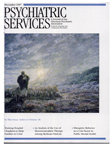Standard olanzapine versus placebo and ineffective-dose olanzapine in the maintenance treatment of schizophrenia
Abstract
OBJECTIVE: Two studies compared the efficacy of standard-dose oral olanzapine (5 to 15 mg a day) with placebo and with ineffective-dose olanzapine (1 mg a day) in maintenance therapy of schizophrenia. METHODS: The studies were 46-week double-blind extensions of multicenter studies that assessed the efficacy of olanzapine in the acute treatment of schizophrenia. Subjects were 120 adults who met DSM- III-R criteria for schizophrenia with an acute exacerbation and who had a minimum score of 24 on the Brief Psychiatric Rating Scale, who had responded to acute therapy (defined as at least a 40 percent reduction in the BPRS score from baseline or a score of 18 or less during up to six weeks of treatment), and who were outpatients at their last acute- phase visit. Relapse was defined as hospitalization for psychopathology. Relapse risk was analyzed using Kaplan-Meier survival analysis and life table analysis. Patients who relapsed were discontinued from the studies. RESULTS: In the first study (N = 58), patients in the standard-dose olanzapine group experienced a significantly lower relapse risk (p = .002) over one year than patients treated with placebo. The estimated one-year risk of relapse with olanzapine was 28.6 percent, compared with 69.9 percent with placebo. Results were similar in the second study (N = 62); patients treated with standard-dose olanzapine had a significantly reduced risk of relapse (p = .018) over one year compared with patients treated with ineffective-dose olanzapine. The estimated one-year risks of relapse were 19.6 percent for standard-dose olanzapine and 45.5 percent for ineffective-dose olanzapine. CONCLUSIONS: Olanzapine is superior to placebo and ineffective-dose olanzapine in the maintenance therapy of schizophrenia.



